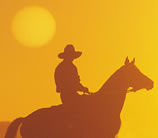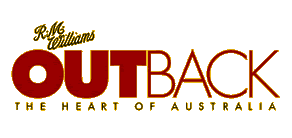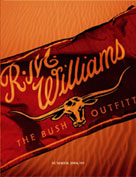ADVENTURE
Savannah vision
Story Dick Eussen
Photos Dick Eussen, Evan Tandy and Tom Warnes

Back in 1982, John Courtenay had a vision. There were no specialised tourist guides in the Gulf Country, and the former Gulf Local Authorities Association chief executive officer's concept was to train guides who could man strategic locations as protectors and interpreters, and act as a launch for employment opportunities and flow-on effects for isolated Gulf communities and cattle stations.
John's dream came to fruition when a group of people formed Savannah Guides. But suitable people had to be trained and the first Savannah Guides School was launched in April 1988. It attracted a handful of pupils who heard lectures from qualified experts about flora and fauna, history, environment, resource management and views from traditional owners.
Today, the Savannah Guides School is recognised by its peers as one of the best in the world, with some classes attracting more than 100 students. The school is held three times a year across the tropical savannah, which covers an extensive and diverse realm encompassing 19 biogeographical regions across the top third of Australia, west from Charters Towers to Longreach and Broome, WA.
The promotion of the Savannah Way from Cairns to Broome by combined Queensland, Western Australian and Northern Territory tourist bodies has highlighted the need for accredited guides as never before along the 3000-kilometre route, which gives access to four World Heritage regions, 15 national parks and some of the last remaining wilderness in Australia. While most people self-drive (mostly four-wheel-drive) the Savannah Way, there are others who prefer the comforts, information and mantle of safety that tour operators provide. "It's not only a great destination, but an emotional experience not found elsewhere," says Tom Warnes, past president of Savannah Guides, and the owner/operator of Wilderness Challenge Tours.
Tom says that most people who make use of his multi-award winning accredited safari operation are over 55 year-old Australians. "People who go on our tour want to know and learn what makes this country tick, its natural and cultural history and want the chance to meet real bush people," he explains. "History is high on the list and the route certainly has it all, with relic mining sites and historic towns along the way."
But, Tom concedes, selling the product isn't easy. "There is a certain ignorance about the tropical savannah, especially the Gulf Country," he explains. "Cape York, the Top End and the Kimberley are far better known. But we have stuck with this region of epic proportions as we pioneered it. One day it has to come of age and reward our passion, patience and commitment."
To be a Savannah Guide, candidates must have a commitment that meets strong conservation principles and values, says Russell Boswell, president of the non-profit organisation. "They must be prepared to meet strict standards and abide by a professional code of conduct. They are respected members of the community and generally have an intimate knowledge, not only of the country, but also of birdwatching, flora and fauna, geology, history, traditional issues, public relations and even fishing."
Guides need special driving and people talents that include first-aid certificates, mechanical and four-wheel-drive recovery skills and camp cooking. They also do refresher courses every two years. "It's no wonder that many Savannah Guides have tertiary qualifications,or specialist lore that only bush people have, to pass the test," says Russell. "We now have guides right across the savannah and in all major centres."Guides come from all walks of life - pastoralists, tour, cultural and guided fishing operators, academics, bush people and even train drivers. Many members come from local communities, inspired by the motto ‘Protectors and interpreters of the outback's an ideal that, through study and training, has bonded a unique band of people that are driven by regional development, active conservation principles and personal motives to share their bush knowledge with others.
"It is a learning group," says Jim Fitzgerald, who became a Savannah Guide in 1998, "that is enforced by attending training schools where mateship and interests are renewed and nurtured at a bush breakfast and evening campfires with a few drinks and a sing-a-long. It's not all study, we have a lot of fun."
It's these shared experiences, peer assessment and an internal culture that strives to strengthen and improve knowledge and expertise that has shaped the Savannah Guides into an organisation well positioned to offer its services to communities for promotional enterprises and tourism.
Nature-based and ecotourism- strong marketing names that promise something better than mass tourism - have seen government-backed developments aimed at goals and ethical developments of an sustainable industry backed by integrity, knowledge, perception and kinship of Australia's natural treasures. The role of the Savannah Guides is one that fits the model. "More than ever before, visitors are keenly environmentally aware," says Bram Collins, assistant general manager of Undara Experience. "They wish to see and learn about the places they visit, rather than just take a picture, and accurate interpretation is what the Savannah Guides are all about."
Bram points out the flow-on benefits of the liaison of places like Undara and Savannah Guides to outback communities. "We employ about 40 people," he informs. "Mount Surprise has benefited since the Savannah Guides and Undara were first floated. It now has two caravan parks, new houses and other allied business. People tend to stay on longer to explore and many do it with the services of a guide. Properties that are a part of accredited Savannah Guide stations get extra income ... it all helps the family to stay on the land."
Savannah Guide stations are scattered along the Savannah Way. Most are private properties branching out into ecotourism, with family members acting as accredited Savannah Guides. It has opened up pristine areas of rare beauty that were previously closed to the public, places where proud owners share the land with visitors.
The Savannah Guides were recognised internationally when they were highly commended at the 1996 British Airways Tourism for Tomorrow Awards, and won the 1996 Queensland Tourism Award for Industry Training. They went back to the UK in 2000 and were declared Global Winner, Tourism Organisation, at that year's British Airways Tourism for Tomorrow Awards, topping it off by also winning the Australian Division Award. These awards and worldwide media promotion have made Savannah Guides a distinctive and strong marketing tool for its members and associated organisations.
"Being a member has helped my business," says Rick Murray of Darwin's multi-award winning Odyssey Tours & Safaris. "They have a great future in the Top End, with their nature and ecotourism approach. Being a Savannah Guide is not for everyone, it only attracts people who genuinely want a career in tourism. It's a very committed group, and we get excellent feedback from clients about their skills."
This is enforced by Max and Phillipa Davidson of Davidson's Arnhem Land Safaris. "The marvellous thing about the Savannah Guides is that it provides the industry with a ready pool of accredited people," says Max, who became an accredited guide after hosting a guides school at Mount Borradaile in 1999. "Operators can take advantage of it without having to go to the costly search of finding or training people for the job. It injects a high standard of integrity and marketing skills into the industry, one that is now well recognised by travel agents and clients."
But, perhaps the last word is from the organisation's most famous
graduate and prestige guide, Professor David Bellamy OBE: "Savannah
Guides - the visionary role model at the cutting edge of conservation and
sustainable tourism." ![]()
For more information and details on Savannah
Guides members, stations and operators, contact Savannah Guides Ltd, PO
Box 8043, Cairns, Qld 4873. Phone (07) 4031 7933 fax (07) 4031 7939 email:
info@savannah-guides.com.au
, www.savannah-guides.com.au
Full story: OUTBACK, June/July 2003


